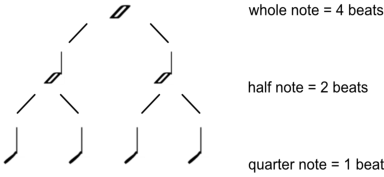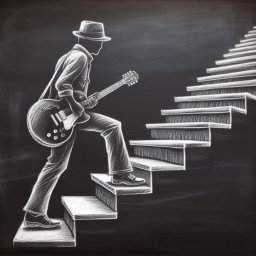
home \ tutorials \ reading rhythm page 2
Two beats: the half note
So the quarter note stands for a single beat. If you strum them on your guitar (or clap them with your hands), you strum ones every beat.
But what if you want your chord to ring two beats long? So you strum ones and let it ring two “counts”? For that there is the “half note”. The half note stands for two beats. The difference with a quarter note is that the note head is not filled, it’s “open”:

Note that when counting rhythms, you also count what you do not play.

You count to four, and you strum or clap on the one and on the three.
Combining quarter and half notes
Of course combinations of different types of notes are possible. Look at the following examples:

Two quarter notes and one half note. You count to four, but clap/strum on 1, 2 and 3.

One half note and two quarter notes Clap/strum on 1, 3 and 4.
Four beats: the whole note
The whole note sounds four beats.You could say that it lasts a whole bar. The whole note only has an open note head, no stem:

One whole note. Count to four, but clap or strum on the one only.
One whole note has the same length as two half notes. Two half notes have the same length as two quarter notes:

One, two, four ... how about three?
We have looked at notes with a length of one, two or four beats. But what if you want to write down a note with a duration of three beats?
There are two ways to accomplish this: tying notes or using a dot.
Let’s look at tying notes first. You can tie a half note and a quarter note. The total length of a half and quarter note is 2 + 1 = 3 beats. You tie notes with a little horizontal bow. In the following example you strum on 1 and on 4. The first strum lasts three beats, the second lasts 1 beat:

The other option is to place a dot (.) after a half note. When a dot is placed after a note, it means that the note has a duration of 1.5 times the original value (so half of the note’s length is added). When a note lasts 2 beats, and you add a dot, it lasts 2 x 1.5 = 3 beats:

The rhythm is exactly the same, only the notation is different.The choice between the two is based on readability. Sometime a tie is easier to read, sometimes a dot is easier.
<<< Previous page | Next page >>>

Everything on guitartutorials.nl is completely free to access. If you’d like to support my work and help keep this resource growing, any and all donations are deeply appreciated. Thank you, and happy playing!